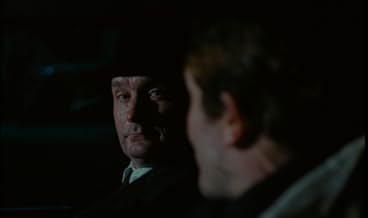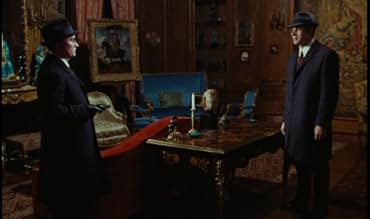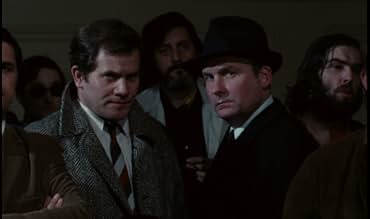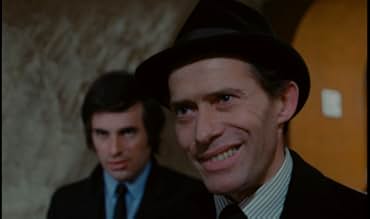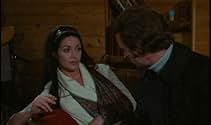Agrega una trama en tu idiomaWhile investigating a drug case, an inspector is shot dead by a gangster. His colleague, Inspector Favenin, is assigned to solve this crime. He is ready to do anything to save his colleague'... Leer todoWhile investigating a drug case, an inspector is shot dead by a gangster. His colleague, Inspector Favenin, is assigned to solve this crime. He is ready to do anything to save his colleague's honor, even if it means going beyond the law.While investigating a drug case, an inspector is shot dead by a gangster. His colleague, Inspector Favenin, is assigned to solve this crime. He is ready to do anything to save his colleague's honor, even if it means going beyond the law.
- Dirección
- Guionistas
- Elenco
Gianni Garko
- Dan Rover
- (as John Garko)
Anne Carrère
- Christine
- (as Anne Carrere)
Théo Sarapo
- Lupo
- (as Theo Sarapo)
Jean-Claude Bercq
- Germain
- (as Jean-Claude Berck)
Stéphan Holmes
- Le jeune garçon
- (as Stephan Holmes)
Opiniones destacadas
The basic motif to see it remains the admirable job of Michel Bouquet. A film about friendship, duty and corruption , simple, precise and using cold tones.
A cop is killed.
His colegue looks for the murderer, using all tools for find him.
Nothing new but seductive for the cinematography and for the wise way to use American model, giving to it profound nuances.
A film about guilty, to.
Interesting for the exploration of characters.
A cop is killed.
His colegue looks for the murderer, using all tools for find him.
Nothing new but seductive for the cinematography and for the wise way to use American model, giving to it profound nuances.
A film about guilty, to.
Interesting for the exploration of characters.
Harry Callaghan and Popeye Doyle have become iconic characters since their first appearances in the early seventies and the Rogue Cop genre has remained extremely popular.
To non-European audiences Inspector Favanin is hardly likely to be a household name. His character appeared in 1970 in this film of Yves Boisset and it is well-nigh impossible fifty years on to appreciate just what an impact the film made and the obstacles its director faced to get it released without cuts. Due to its graphic violence and its depiction of the police, Boisset was obliged to go before a censorship committee one of whose members was Jean-Pierre Melville(!) and eventally its release was approved. Suffice to say its notoriety guaranteed excellent box office.
The masterstroke here is the casting, against type, of Michel Bouquet. When his friend and colleague played by Bernard Fresson is killed in the line of duty Favenin becomes an avenging angel, using any means at his disposal to track down those responsible, thereby becoming not only judge and jury but also executioner.
As one would expect from Boisset this is a study in corruption and furthermore, by the standards of its time its content is relentlessy grim, desolate and bloody. There are no romantic, folk hero types here with their particular moral codes in the style of Melville but instead beasts in the jungle. Does Favenin regret his actions? The final shot of him sitting alone is cleverly ambiguous.
Bouquet is riveting in the role and he is ably supported by Adolfo Celi, Michel Constantine, Gianni Gekko, Henri Garcin and Francoise Fabian.
Although this film undeniably broke new ground and forever transformed the genre in France, I personally harbour no desire to view it again.
Ironically, it was knocked off its top slot by 'Le Cercle Rouge' of none other than Jean-Pierre Melville!
To non-European audiences Inspector Favanin is hardly likely to be a household name. His character appeared in 1970 in this film of Yves Boisset and it is well-nigh impossible fifty years on to appreciate just what an impact the film made and the obstacles its director faced to get it released without cuts. Due to its graphic violence and its depiction of the police, Boisset was obliged to go before a censorship committee one of whose members was Jean-Pierre Melville(!) and eventally its release was approved. Suffice to say its notoriety guaranteed excellent box office.
The masterstroke here is the casting, against type, of Michel Bouquet. When his friend and colleague played by Bernard Fresson is killed in the line of duty Favenin becomes an avenging angel, using any means at his disposal to track down those responsible, thereby becoming not only judge and jury but also executioner.
As one would expect from Boisset this is a study in corruption and furthermore, by the standards of its time its content is relentlessy grim, desolate and bloody. There are no romantic, folk hero types here with their particular moral codes in the style of Melville but instead beasts in the jungle. Does Favenin regret his actions? The final shot of him sitting alone is cleverly ambiguous.
Bouquet is riveting in the role and he is ably supported by Adolfo Celi, Michel Constantine, Gianni Gekko, Henri Garcin and Francoise Fabian.
Although this film undeniably broke new ground and forever transformed the genre in France, I personally harbour no desire to view it again.
Ironically, it was knocked off its top slot by 'Le Cercle Rouge' of none other than Jean-Pierre Melville!
Yves Boisset is a very special director, he has made many good films, most importantly, in my opinion, "The Assassination" (1972), with the great Gian Maria Volontè and many other exceptional actors, and "Dog Day"(1984) , with the unparalleled Lee Marvin. In "The Assassination", as a corrupt lawyer, we find the extraordinary Michel Bouquet, who here, in "The Cop", he is the cop, a policeman like you have not seen in other movies, a cop with an original philosophy, kindred somehow, with Clint Eastwood's Dirty Harry. But different! Michel Bouquet is an actor who does not need too many specific means or too many replicas to create memorable characters, Michel Bouquet is an absolute force, only by the way he looks, moves and breathes. Likewise, but in another register, it is Michel Constantin, who also plays a smaller role, but, as usual, natural, impeccable. Françoise Fabian is beautiful and natural. Probably the best part of Gianni Garko. So, Bernard Fresson. Adolfo Celi, a small role too but, as usual, very effective. Rufus, Théo Sarapo, Henri Garcin, Pierre Massimi, the same, very good. Need absolutely to be seen!
Generally,this movie is considered the first "true " film of this director .It had huge problems with the censorship (it was not to be the last time : "RAS" and "Le Juge Fayard Dit Le Sheriff" had also problems) because of the way it showed the police ,whose "methods" were close to those of gangsters;in order not to ruin his producer ,the director cut 8 minutes and remade a whole scene.
It's still watchable today ,thanks to Boisset's nervy style even before the cast and credits :the prologue is violence itself and violence is present -such an intensity was not common in 1970-all through the movie till the last pictures.
"The role of the police is to take care of the society as it is ,not to reform it" says chief superintendent Adolfo "thunderball" Celi;and another sentence has remained famous;the cop (Michel bouquet) to Françoise Fabian " a body which works well is not a body which does not produce waste ,but which eliminates them properly".
We feel the "after 68" zeitgeist in the meeting at the beginning of the movie and the posters in Rufus's house shows Boisset's anti -militarism -which will come to the fore with "RAS" in 1973);one of the posters reads:"army humiliates,imprisons and kills "
That said,the characters are cardboard ("deep" figures have never been Boisset's forte and never will),the screenplay rather simplistic -compared to the works to come such as "Dupont La Joie",but it has become a film noir semi-classic ;indeed,Michel Bouquet's character verges on madness nay psychopathy with a straight face and a total lack of humanity.
Yves Boisset was actually the successor of André Cayatte ,with more aplomb and less endearing characters .All through the seventies,he tried to clean the Augean stables of his country.
NB "Condé " in French has 2 meanings
a)cop
b)a deal which allows one to pursue illegal activities in exchange for information; the second meaning can be applied to Françoise Fabian's brother who wants to stay loyal and pure and refused the deal
It's still watchable today ,thanks to Boisset's nervy style even before the cast and credits :the prologue is violence itself and violence is present -such an intensity was not common in 1970-all through the movie till the last pictures.
"The role of the police is to take care of the society as it is ,not to reform it" says chief superintendent Adolfo "thunderball" Celi;and another sentence has remained famous;the cop (Michel bouquet) to Françoise Fabian " a body which works well is not a body which does not produce waste ,but which eliminates them properly".
We feel the "after 68" zeitgeist in the meeting at the beginning of the movie and the posters in Rufus's house shows Boisset's anti -militarism -which will come to the fore with "RAS" in 1973);one of the posters reads:"army humiliates,imprisons and kills "
That said,the characters are cardboard ("deep" figures have never been Boisset's forte and never will),the screenplay rather simplistic -compared to the works to come such as "Dupont La Joie",but it has become a film noir semi-classic ;indeed,Michel Bouquet's character verges on madness nay psychopathy with a straight face and a total lack of humanity.
Yves Boisset was actually the successor of André Cayatte ,with more aplomb and less endearing characters .All through the seventies,he tried to clean the Augean stables of his country.
NB "Condé " in French has 2 meanings
a)cop
b)a deal which allows one to pursue illegal activities in exchange for information; the second meaning can be applied to Françoise Fabian's brother who wants to stay loyal and pure and refused the deal
Yves Boisset directs "Un Condé" with remarkable succintness and efficiency. To that end he is greatly assisted by Michel Bouquet's deadpan, top drawer performance, who in turn is well supported by Bernard Fresson, Adolfo Celi, Gianni Garko and the beautiful Françoise Fabian.
Inspector Favenin's character is built layer by layer and Bouquet emerges very convincingly as a copper doubling up as vigilante. The script is very good, with sharp dialogue, including copper talk in French. It would appear that this film provided some inspiration for DIRTY HARRY the following year and DEATH WISH in 1974.
Very competent and economical cinematography, reminiscent of Don Siegel's straightforward punches pulled approach to action.
I strongly recommend this film to anyone interested in film noir and in the French cinema.
Inspector Favenin's character is built layer by layer and Bouquet emerges very convincingly as a copper doubling up as vigilante. The script is very good, with sharp dialogue, including copper talk in French. It would appear that this film provided some inspiration for DIRTY HARRY the following year and DEATH WISH in 1974.
Very competent and economical cinematography, reminiscent of Don Siegel's straightforward punches pulled approach to action.
I strongly recommend this film to anyone interested in film noir and in the French cinema.
¿Sabías que…?
- TriviaAlthough his film is close to Pierre Lesou's novel, director Yves Boisset confessed that, during the scene between Michel Constantin and Michel Bouquet, he was influenced by Jean-Pierre Melville's films' atmosphere and dialogue.
- Versiones alternativasDue to pressure from then French Minister of the Interior Raymond Marcellin, the film had a tough time getting approved for release and director Yves Boisset was finally forced to cut a few lines of dialogue and reshoot the interrogation scene. The film was shown uncut and with the original scene internationally. In France, the original scene can be seen as a bonus feature on home video.
- ConexionesReferenced in Parole de cinéaste: Yves Boisset: le cinéaste le plus censuré de France (2013)
Selecciones populares
Inicia sesión para calificar y agrega a la lista de videos para obtener recomendaciones personalizadas
Detalles
- Fecha de lanzamiento
- Países de origen
- Idiomas
- También se conoce como
- The Cop
- Locaciones de filmación
- Fourges, Vexin-sur-Epte, Eure, Francia(ending scene at the water mill)
- Productoras
- Ver más créditos de la compañía en IMDbPro
- Tiempo de ejecución
- 1h 35min(95 min)
- Mezcla de sonido
- Relación de aspecto
- 1.66 : 1
Contribuir a esta página
Sugiere una edición o agrega el contenido que falta

